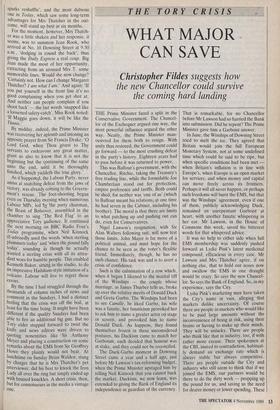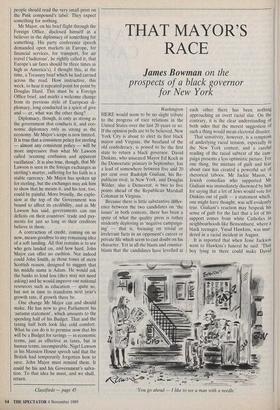THE TORY CRISIS
WHAT MAJOR CAN SAVE
Christopher Fildes suggests how the new Chancellor could survive the coming hard landing
THE Prime Minister faced a split in the Conservative Government. The Chancel- lor of the Exchequer argued one way, the most powerful influence argued the other way. Neatly, the Prime Minister man- oeuvred for them both to resign. With unity thus restored, the Government could go forward — to the most crushing defeat in the party's history. Eighteen years had to pass before it was returned to power. This was Balfour's government, with the Chancellor, Ritchie, taking the Treasury's free trading line, while the formidable Joe Chamberlain stood out for protection, empire preference and tariffs. Both could be shed, for neither was 'one of us' (which to Balfour meant his relations; at one time he had seven in the Cabinet, including his brother). The moral is that there are limits to what patching up and pushing out can do, even for Conservatives.
Nigel Lawson's resignation, with Sir Alan Walters following suit, will now test those limits. John Major is far more of a political animal, and must hope for the chance to be seen as the voter's flexible friend. Immediately, though, he has no such chance. His task was and is to avert a crisis of confidence.
Such is the culmination of a row which, when it began I likened to the "marital tiff of the Winships — the couple whose marriage, as James Thurber tells us, broke up over the relative merits of Donald Duck and Greta Garbo. The Winships had been to see Camille, he liked Garbo, his wife was a fanatic, her fanaticism provoked her to ask him to name a greater actor on stage or screen, and provoked him to name Donald Duck. As happens, they found themselves frozen in these unconsidered postures, his Duckism came to match her Garboism, each decided that honour was at stake, and they could not be reconciled.
The Duck-Garbo moment in Downing Street came a year and a half ago, just before Mr Lawson's tax-reforming budget, when the Prime Minister upstaged him by telling. Neil Kinnock that you cannot buck the market. Duckism, we now learn, was extended to giving the Bank of England its independence as guardian of the currency.
That is remarkable, for no Chancellor before Mr Lawson had so harried the Bank into submission. Did he repent? The Prime Minister gave him a Garboist answer.
In June, the Winships of Downing Street tried to melt the ice. They agreed that Britain would join the full European Monetary System, not at some undefined time which could be said to be ripe, but when specific conditions had been met when Britain's inflation is in line with Europe's, when Europe is an open market for services, and when money and capital can move freely across its frontiers. Perhaps it will all never happen, or perhaps such freedoms will burst the EMS, but that was the Winships' agreement, even if one of them, publicly acknowledging Duck, remained an unrepentant Garboist at heart, with another fanatic whispering in her ear. Mr Lawson, in the House of Commons this week, saved his bitterest words for that whispered advice.
It was no help to either side when full EMS membership was suddenly pushed forward as Lydia Pink's latest medicinal compound, efficacious in every case. Mr Lawson and Mrs Thatcher agree, if on nothing else, that to hold our noses now and swallow the EMS in one draught would be crazy. So says the new Chancel- lor. So says the Bank of England. So, in my experience, says the City.
Lydia Pink's marketing men have taken the City's name in vain, alleging that markets dislike uncertainty. Of course there are people in markets who would like to be paid large amounts without the inconvenience of being at risk, using their brains or having to make up their minds. They will be unlucky. There are people who think like that in industry, too, if with rather more excuse. Their spokesmen at the CBI, inured to contradiction, habitual- ly demand an exchange rate which is always stable but always competitive. There are people outside the City and industry who still seem to think that if we joined the EMS, our partners would be there to do the dirty work — propping up the pound for us, and saving us the need for dearer money or lower spending. These
people should read the very small print on the Pink compound's label. They expect something for nothing.
Mr Major, on his brief flight through the Foreign Office, disclosed himself as a believer in the diplomacy of something for something. His party conference speech demanded open markets in Europe, for financial services, for transport, for air travel (ludicrous', he rightly called it, that Europe's air fares should be three times as high as America's). I thought this, at the time, a Treasury brief which he had carried across the road. How instructive, this week, to hear it repeated point for point by Douglas Hurd. This must be a Foreign Office brief, and marks a welcome change from its previous style of European di- plomacy, long conducted in a spirit of give and — er, what was the other thing?
Diplomacy, though, is only as strong as the government that conducts it, and eco- nomic diplomacy only as strong as the economy. Mr Major's scope is now limited. It is true that a Consistent policy for sterling — almost any consistent policy — will be more impressive than what Mr Lawson called 'seeming confusion and apparent vacillation'. It is also true, though, that Mr Lawson is seen in the foreign exchanges as sterling's martyr, suffering for his faith in a stable currency. Mr Major has spoken up for sterling, but the exchanges may ask him to show that he means it, and his test, too, could be painful. More broadly, the explo- sion at the top of the Government was bound to affect its credibility, and as Mr Lawson has said, governments can run deficits on their countries' trade and pay- ments for just so long as their creditors believe in them.
A contraction of credit, coming on us now, means goodbye to any remaining idea of a soft landing. All that remains is to see who gets landed on, and how hard. John Major can offer no cushion. Nor indeed could John Smith, in those tones of stern Scottish reason, designed to suggest that his middle name is Adam. He would ask the banks to lend less (they may not need asking) and he would improve our national resources such as education — quite so, but not in time to transform next year's growth rate, if growth there be.
One change Mr Major can and should make. He has now to give Parliament his 'autumn statement', which amounts to the spending half of his Budget. That and the taxing half both look like cold comfort. What he can do is to promise now that his will be a Budget for savings — in economic terms, just as effective as taxes, but in human terms, incomparable. Nigel Lawson in his Mansion House speech said that the British had temporarily forgotten how to save. John Major must remind them. It could be his and his Government's salva- tion. To that idea he must, and we shall, return.

















































 Previous page
Previous page